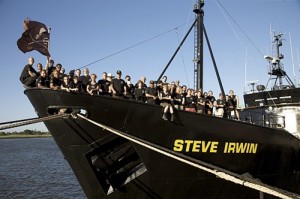 Diplomatic cables released by Wikileaks show that the Japanese government viewed the Sea Shepherd Conservation Society as a serious threat to its illegal whaling, and urged the United States to crack down on the group.
Diplomatic cables released by Wikileaks show that the Japanese government viewed the Sea Shepherd Conservation Society as a serious threat to its illegal whaling, and urged the United States to crack down on the group.
Shuji Yamada, Japan’s vice minister in charge of fishing and whaling, urged John Roos, U.S. Ambassador to Japan, to take action. According to a 2009 cable:
Yamada inquired about an investigation into the tax status of the U.S.-based NGO Sea Shepherd Conservation Society and repeated Japan’s request for the U.S. to take action against the organization, which he said created a very dangerous situation on the seas…
Another cable reveals that Sea Shepherd had been successfully impeding Japan’s whaling operations, and have “kept the fleet from reaching its quota the last few years. Yamashita said the GOJ [government of Japan] would come under pressure domestically if SSCS [Sea Shepherd] harassment continues.”
The Sea Shepherd’s have long been smeared as “eco-terrorists” by a variety of corporate and political interests. Japan has gone so far as to attack Animal Planet (host of the reality TV show “Whale Wars”) as supporting eco-terrorism. Meanwhile, other special interests, such as the Center for Consumer Freedom, have long pressured the U.S. to revoke the nonprofit status of activists groups like PETA.
These diplomatic cables are an example of how this scare-mongering works its way into official government policy.
More importantly, it is an excellent example of the “threat” posed by so-called eco-terrorist groups: in this case, Sea Shepherd was a threat because the group successfully, and non-violently, impeded the Japanese whaling industry’s ability to kill whales.
Hat tip to Yoree Koh for digging up the Wikileaks cables.